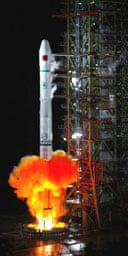China has given notice of its increasing power in space - and provoked widespread international concern - with a successful test of an anti-satellite weapon that could be used to knock out enemy surveillance and communications craft.
In the first such test since the cold war era, the White House confirmed that China had used a medium-range ballistic missile, launched from the ground, to destroy an ageing weather satellite more than 500 miles into space. "We are aware of it and we are concerned, and we made it known," the White House spokesman, Tony Snow, told reporters.
The test, on January 11, was the first of its kind since 1985 when Washington halted such exercises because of fears of damaging military and civilian satellites with large clouds of debris.
The test was especially troubling because it exposed the vulnerability of America's dependence on low-orbiting satellites, which are used for military communications, smart bombs and surveillance. In theory, last week's exercise could give Beijing the capability to knock out such satellites - a realisation that underlay the protests from Washington.
Australia and Canada also voiced concerns; Britain, South Korea and Japan were expected to follow. "The US believes China's development and testing of such weapons is inconsistent with the spirit of cooperation that both countries aspire to in the civil space area," Gordon Johndroe, a White House spokesman, said. "We and other countries have expressed our concern regarding this action to the Chinese."
Scientists have long warned of the dangers of space debris - which can remain in orbit for many hundreds of years - on existing space programmes. Among the items lost in space are lens caps, tools and nuts and bolts. Some former Soviet satellites leak fuel which solidifies into balls up to 3cm in diameter. Tiny pieces, including flecks of paint from eroding satellites, can travel at 17,000mph, and gain enough momentum to damage a medium-sized spacecraft.
Despite yesterday's protests, the Bush administration has opposed a global ban on such tests, arguing that America needs to reserve its freedom of action in space. Arms control experts said it was not immediately clear whether the Chinese test was a ploy to try to press the Bush administration into a global weapons treaty, or whether China was asserting its own interests in space.
News of the test, first reported by the magazine Aviation Week and Space Technology, comes months after the Bush administration unveiled a doctrine asserting America's right to take action against any perceived threat in space. The missile relied on the force of impact rather than an exploding warhead to shatter the satellite.
Estimates said the destroyed Chinese satellite could have shattered into tens of thousands of fragments that would remain in orbit for more than a decade.
The magazine said on its website: "Details emerging from space sources indicate that the Chinese Feng Yun 1C (FY-1C) polar orbit weather satellite launched in 1999 was attacked by an asat (anti-satellite) system launched from or near the Xichang space centre."
Last August, Mr Bush laid out an even more robust vision of America's role in space, asserting Washington's right to deny access to any adversary hostile to US interests, and some arms control experts have accused the administration of conducting secret research on laser weapons to disable and destroy enemy satellites.
In public, Mr Bush has sought to revive the national interest in space by calling for Americans to return to the moon in 15 years, and even use bases there as a launchpad for Mars. However, almost all of those costly military space programmes are over budget and behind schedule.
